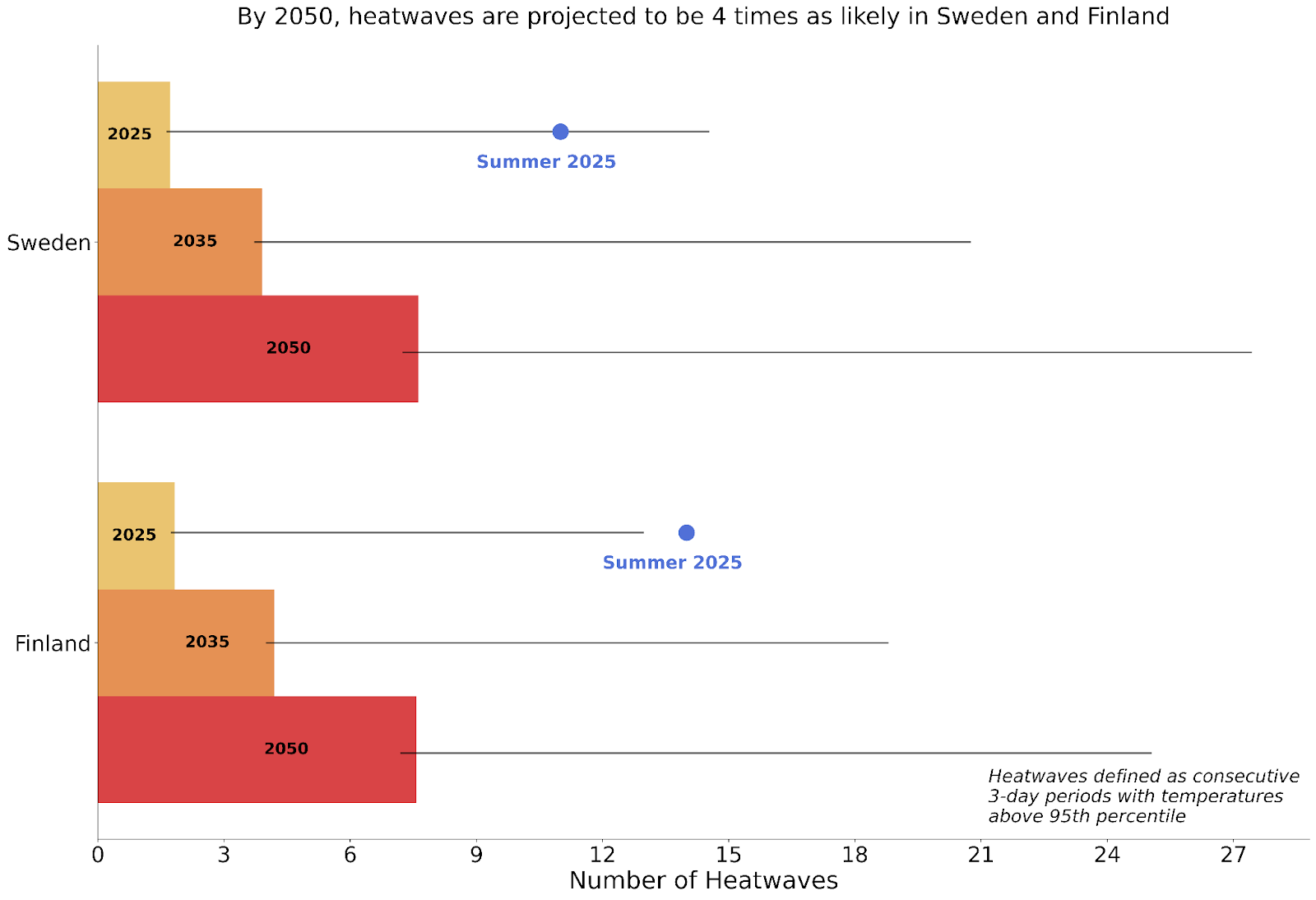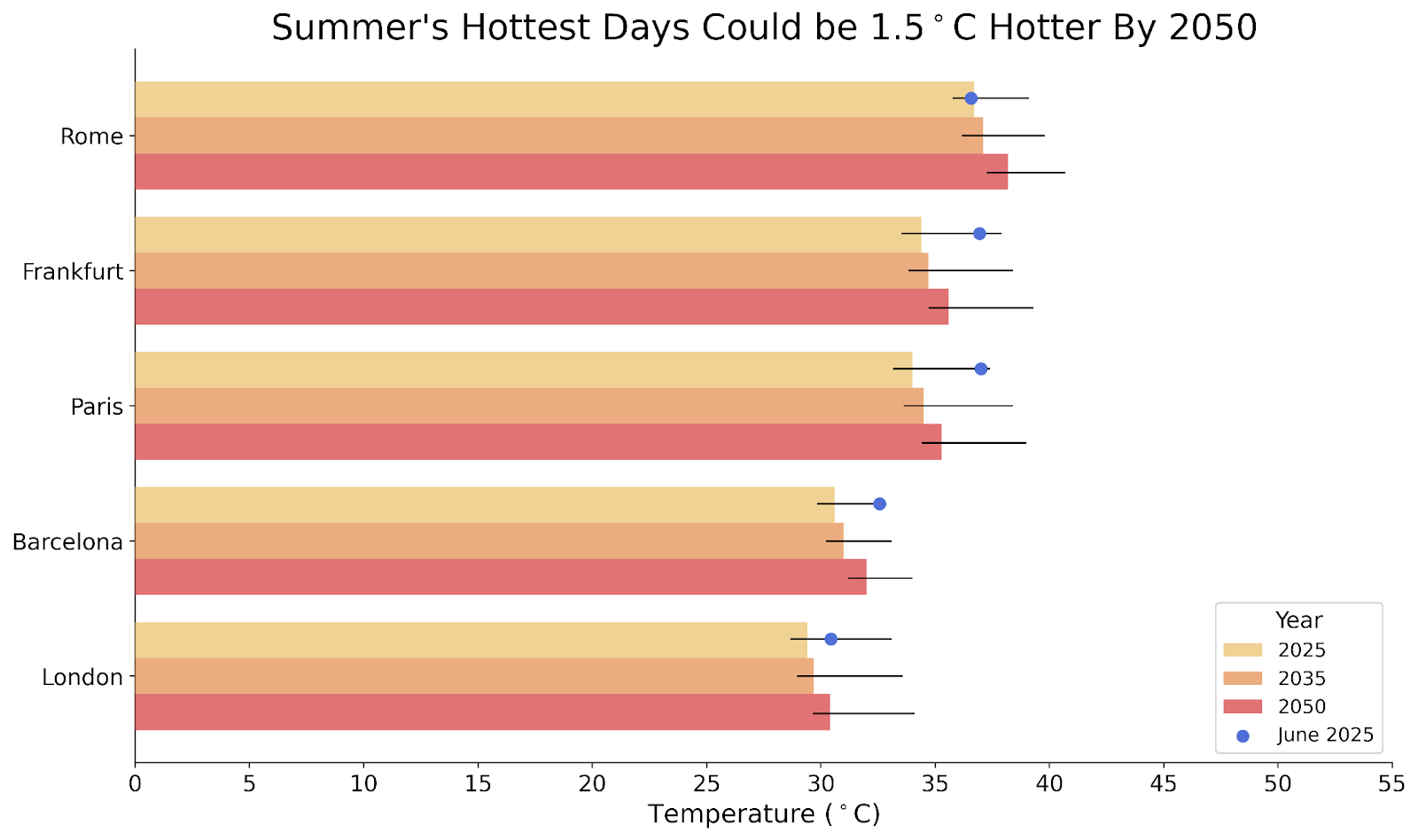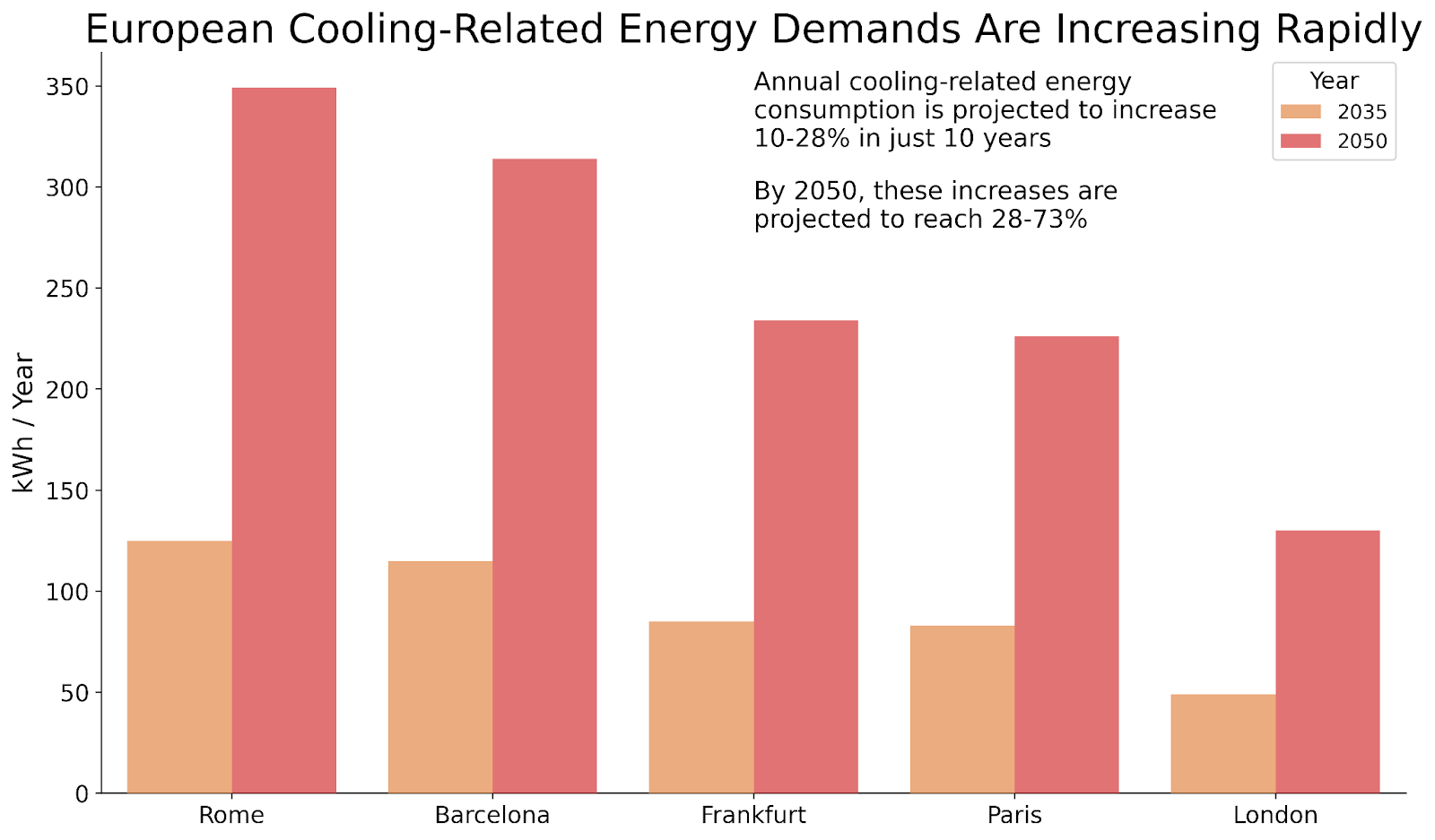.jpg)
Summer 2025 set records around the world. Japan, South Korea, Ireland, and the United Kingdom all recorded their hottest summers ever, while the Northern Hemisphere overall experienced its third-hottest summer on record. The season wasn’t defined only by isolated heatwaves, but by an unrelenting persistence of high temperatures that turned whole months into endurance tests.
Health impacts were immediate: thousands of excess deaths and tens of thousands of hospitalizations occurred across Asia and Europe, while workplace heat stress became an urgent focus for both the World Health Organization and the World Meteorological Organization. Economic and energy systems strained under conditions that pushed the limits of what infrastructure and people were built to tolerate.
Chronic Heat: When Every Day Feels Like the Hottest
In Japan, South Korea, Ireland, and the United Kingdom, the story of 2025 wasn’t one of a single blistering week. It was months of oppressive heat. Compared with the 1991–2020 average, Ireland and the UK were 1–2°C (1.8–3.6°F) hotter on average. In Japan and South Korea, the increase was closer to 2°C (3.6°F).


In Hokkaido, Japan’s northernmost and typically cool prefecture, temperatures soared to nearly 40°C (104°F), averaging 4°C (7.2°F) warmer than normal. The nation also recorded a new all-time high of 41.8°C (107.2°F). The result: more than 90,000 hospitalizations for heat-related illness. In Seoul, residents endured over 30 tropical nights (minimums above 25°C/77°F), while Tokyo experienced nearly 40.
Persistent high-pressure systems, clear skies, and warm seas locked in the heat, producing conditions the UK Met Office described as an environment “where heat builds quickly and lingers”. Even nights offered no respite, a trend that dramatically increases both physiological stress and grid strain alike.
By 2050, hot days (above 35°C/95°F) are projected to increase by 1.5 to 3 times in Japan and South Korea; in the UK and Ireland, hot days (over the 99th percentile of temperature) are projected to double.

Acute Heat: When Extremes Strike
While chronic heat wears on the body and the grid, acute heatwaves trigger immediate crises. The summer of 2025 brought multiple waves of severe, region-spanning heat, particularly in nations unaccustomed to it.
Scandinavia’s Long, Hot July
In July, Sweden, Norway, and Finland endured an exceptional heatwave. For 13 consecutive days, Sweden’s national daily high topped 25°C (77°F), and Finland remained above that level for 22 straight days. While absolute highs didn’t break 2018 records, the duration was unprecedented. Jupiter’s data projects that heatwaves in Sweden and Finland will become four times more likely by 2050. A seemingly small 0.2°C (0.36°F) of additional warming since 2018 has already doubled the likelihood of heatwaves like this, underscoring how nonlinear these impacts can be.


In the far north, the impact ripples beyond human health. For the Sámi people, whose livelihoods depend on reindeer herding, hotter summers disrupt migration and grazing. Meanwhile, warming lakes trigger algal blooms that threaten water quality and aquatic ecosystems.
Western Europe’s Early Heatwave
By late June, temperatures soared across western Europe. Highs surpassed 35°C (95°F) across much of the continent, and nighttime lows stayed above 20°C (68°F). These temperatures aligned with the upper range of Jupiter’s projections for 2025.

Attribution studies suggest that climate change tripled the death toll from this heatwave, exacerbated by its early timing and persistently warm nights. Simultaneous heat in North America exposed over 250 million people to extreme temperatures.
The ripple effect on energy was immediate and profound. Jupiter’s projections indicate that annual cooling-related energy demand in western European cities will rise 10–28% by 2035, and as much as 73% by 2050. Northern cities such as London and Frankfurt, where air conditioning is still rare, face the steepest relative increases.

When Cool Destinations Become Hot Zones
Extreme heat is no longer confined to tropical or desert nations. The steepest percent increases in heat-related losses are occurring in the north: places like Ireland, the UK, and Finland. Europe is now the fastest-warming continent, with 2025 alone responsible for roughly 25,000 heat-related deaths, two-thirds of which are directly attributed to climate change.
By mid-century, cooling losses could double in many northern European cities, while cooling degree days (a measure of how much and how often outdoor temperatures exceed levels that typically require air conditioning) are expected to rise even more sharply.

In Japan’s Hokkaido region, cooling-related energy losses may increase 55%, compared with 25% nationally, reflecting how relative vulnerability to heat can outpace absolute heat itself.
While southern Europe, Japan’s main islands, and the U.S. Sun Belt will remain the hottest, cooler nations are now the fastest-changing. Their infrastructure, economies, and health systems are less prepared for heat stress, amplifying their vulnerability to exposure.
The Cost of Inaction
The 2025 heat season was a preview of a new reality: one where small shifts in temperature translate into exponential changes in impact. Whether we frame it as chronic heat, acute events, or rapidly increasing relative risk, the message is the same: heat risk is growing faster than our ability to adapt.
The World Meteorological Organization and World Health Organization have found that worker productivity declines 2–3% for every degree above 20°C (68°F). As global temperatures rise, that loss compounds across industries, sectors, and economies.
The Imperative for Preparedness
In this era of compounding extremes, adaptation plans can no longer rely on historical averages. Risk and ESG professionals must plan for the tails of the distribution — the extremes that define tomorrow’s losses.
Jupiter’s forward-looking data equips decision-makers with probabilistic projections of heat, flood, and other perils that reflect not only average changes but also the behavior of extremes. Our data can then model multiple adaptation scenarios using local construction costs, so our customers can compare their adapted and unadapted losses, and even see the break-even point and ultimate ROI of their resilience plans. With a science-first approach, globally trusted data and transparent methodology, Jupiter helps organizations prepare for the world as it is becoming, not as it was.
Speak with a Climate Expert
If you would like to see a ClimateScore Global demo in action and speak directly with a Jupiter climate expert, reach out to us here.
__________________________________________
References
- Jackson, J, A. Philipson, J.-K. Kang. “UK, Japan, South Korea endure hottest summer on record”. Phys.Org, 01 September, 2025.
- Met Éireann. “Provisionally warmest summer on record for Ireland”. Met Éireann, 03 September 2025.
- Press Office, UK Met Office. “Summer 2025 is the warmest on record for the UK”. United Kingdom Meteorological Office, 01 September 2025.
- Copernicus Climate Service, European Center for Medium-range Weather Forecasting. “Monthly climate bulletins: August 2025”. 09 September 2025.
- Flouris, A.D., L. Nybo, T. Kjellstrom, J. Shumake-Guillemot, and I.D. Ivanov (2025). Climate Change and Workplace Heat Stress: Technical Report and Guidance. World Health Organization and World Meteorological Organization.
- Copernicus Climate Change Service (2023): ERA5 hourly data on single levels from 1940 to present. Copernicus Climate Change Service (C3S) Climate Data Store (CDS), DOI: 10.24381/cds.adbb2d47 (Accessed on 09-SEP-2025).
- Reuters. “Japan sets record high temperatures, worries mount over rice crops.” Reuters, 05 August 2025.
- Yeung, J. H. Montgomery, and Y. Asada. “How the world’s most elderly country is fighting heat in a deadly double crisis”. CNN, 19 September 2025.
- Chae, Y.-H. “Nation records hottest summer on record in 2025”. Yonhap News Agency, 01 September 2025.
- Climate Central. “Japan and South Korea endure record-breaking summer heat fueled by climate change - August 2025”. ClimateCentral.org, 14 August 2025.
- Carrington, D. “‘No country is safe: deadly Nordic heatwave supercharged by climate crisis, scientists say”. The Guardian, 14 August 2025.
- Barnes, C., B. Clarke, M. Rantanen, A. Skålevåg, K. Ødemark, E. Kjellström, M. Vahlberg, R. Singh, and F. Otto. “Intense two-week heatwave in Fennoscandia hotter and more likely due to climate change.” World Weather Attribution, 13 August 2025.
- Clarke, B., et al. (2025): Climate change tripled heat-related deaths in early summer European heatwave. Grantham Institute report, Imperial College London.
- Kouis, P., K. Psistaki, P.K. Yiallouros, and A.K. Paschalidou (2025): The role of heatwave characteristics in cardiovascular mortality in the Eastern Mediterranean region. Environment International, 201, 109563.
- Ordóñez-Lancet, J., J. Smith, and C. Kelly. “Climate change is subjecting more Americans to unbearable extreme heat”. Center for American Progress, 31 July 2025.
- Jupiter Intelligence. “Northeast U.S. heatwave of 2025: A harbinger of the climate we’re inheriting”. Jupiter Intelligence, 4 July 2025.
- Dellanna, A., and M. Can Yilmaz. “These EU countries are air con addicts: Who consumes the most energy to cool down? Euro News, 15 July 2025. [link]
- Press Office, UK Met Office. “Annual climate stocktake shows weather records and extremes now the norm in UK Climate”. United Kingdom Meteorological Office, 14 July 2025.
- Press Office, World Meteorological Organization. “European State of the Climate: extreme events in the warmest year on record”. World Meteorological Office, 15 April 2025.
- Miranda, N.D., J. Lizana, S.N. Sparrow, M. Zachau-Walker, P.A.G. Watson, D.C.H. Wallom, R. Khosla, and M. McCulloch (2023): “Change in cooling degree days with global mean temperature rise increasing from 1.5 °C to 2.0 °C” Nature Sustainability, 6, 1326-1330. doi:10.1038/s41893-023-01155-z.
- Barnes, C., G. Konstantinoudis, P. Masselot, M. Mistry, A. Gasparrini, A.M. Vicedo-Cabrera, E. Theokritoff, B. Clarke, and F. Otto. “Summer heat deaths in 854 European cities more than tripled due to climate change.” Grantham Institute Report, Imperial College U.K. 18 September 2025.
- ILO report
- Sandeman, G. “Britain is hotting up - but is home air-con the answer?” British Broadcasting Corporation, 31 August 2025.
- Kuwashima, H. “Daikin and Panasonic step up measures to deal with severe shortage of air conditioner installers in Hokkaido amid record heatwaves” Sankei Shimbun, 3 August 2025.
.webp)
